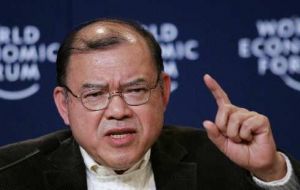MercoPress. South Atlantic News Agency
UN warn austerity measures and deficit cuts is pushing the world towards disaster
 UNCTAD Secretary General Supachai Panitchpakdi Supachai, a former head of the World Trade Organization said current plans are “inept and misconceived”
UNCTAD Secretary General Supachai Panitchpakdi Supachai, a former head of the World Trade Organization said current plans are “inept and misconceived” The pursuit of austerity measures and deficit cuts is pushing the world economy towards disaster in a misguided attempt to please global financial markets, the annual report of the United Nations economic think-tank UNCTAD said on Tuesday.
The report, entitled “Post-crisis policy challenges in the world economy”, savaged US and European economic policies and called for wage increases, stricter regulation of financial markets, including a return to a system of managed exchange rates, and a conscious break with market-led thinking.
“The message here is very pragmatic: we need to reverse our course quickly” said UNCTAD Secretary General Supachai Panitchpakdi. Supachai, a former head of the World Trade Organization, said the policy response to the crisis, with an emphasis on fiscal tightening, was misconceived and inept.
The report's lead author Heiner Flassbeck said the global economic situation was extremely dangerous and, without more stimulus a decade of stagnation was the best-case scenario. The current policies were a disaster, said Flassbeck, head of the globalization and development strategies division at the UN Conference on Trade and Development, and a former deputy finance minister in Germany.
“If interest rates everywhere are zero, and if governments stick to the policy of not only keeping fiscal deficits where they are but retrenching, cutting public expenditure, then we will end up in permanent recession,” he said.
“Unemployment depends very much on demand. And if you have no demand then you need government to step in with a huge program for stimulating the economy. This was the US scenario in the past. Now it's worse because wages are rising less than in the past so you're going to need a bigger stimulus programme.”
The recovery from the financial crisis was not only jobless, which was to be expected, but it was also “wage-less”, he said, with Americans, Japanese and Europeans – 70% of the world economy – expecting their incomes to stagnate. In its last report a year ago, UNCTAD said a premature removal of stimulus policies might cause a deflationary spiral with attendant slumps in growth and employment around the world.
“Let's not fool ourselves. This is a realistic scenario for the whole developed world, if we do not understand the lessons now, and really quickly, because we do not have other instruments any more,” Flassbeck told a news conference to launch this year's report.
“To revive the economy with a wage-less recovery with diminished expectations by the private economy, by private households, what are the instruments at hand? There is nothing.” He said that even if things go well, global economic growth would slow to about 1.5% in 2012, less than half the UN forecast of 3.1% growth for this year.
The report put much of the blame for the crisis on deregulation of financial markets, which it said invited destabilizing “herd behaviour” by speculators, and allowed an over-concentration of banking activities.
“What we've seen in the past and we never learn is that countries seem to have excessive belief in the financial markets. And we've seen time and again that financial markets are not very sound in their judgment” said Supachai.
Flassbeck said the herd mentality was evident whenever equity markets and commodity markets all lurch in tandem on the same day, an effect that could not conceivably be caused by real swings in demand. But the world was ignoring it, he said.
“If the G20 negotiations were not confidential I would tell you that it's ignored even there,” he said. A November summit of the 20 biggest economies would reach “extremely weak” conclusions on tackling the crisis and would underestimate the influence of financial markets, he said.
“We have three areas where the G20 wanted to be strong. The first is the coordination of economic policy: nothing. The second is commodities speculation: more or less nothing; and the third is international global monetary order: nothing. So that's the result of nine months deliberation by the G20.”
The UN report said the world should introduce a system of rules-based floating exchange rates, which kill off distorting “carry trades” in which investors would borrow currencies with low interest rates to buy higher-yielding currencies. The system would be based on divergences between the consumer prices or interest rates applicable to different currencies, and unlike the defunct Bretton Woods system, it would cater for continual adjustments in exchange rates.




Top Comments
Disclaimer & comment rules-

-

Read all comments“Supachai Panitchpakdi” who can take this guy seriously?
Sep 06th, 2011 - 10:55 pm 0Hahahaha
Sep 07th, 2011 - 12:10 am 0Commenting for this story is now closed.
If you have a Facebook account, become a fan and comment on our Facebook Page!